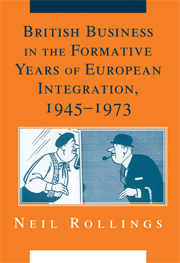Book contents
- Frontmatter
- Contents
- List of Tables and Figure
- Series Editors' Preface
- Acknowledgements
- Abbreviations
- 1 Introduction
- PART I ECONOMIC REALITIES
- PART II THE DEVELOPMENT OF PERCEPTIONS OF EUROPEAN INTEGRATION
- 4 From 1945 to June 1955: The Marshall Plan and the European Coal and Steel Community
- 5 The Establishment of the Common Market and the Free Trade Area Proposals, 1955–1958
- 6 Creating EFTA, Applying to the EC, and de Gaulle's Veto, 1958–1963
- 7 After de Gaulle's First Veto, the Second Application, and the Second Veto, 1963–1968
- 8 The End Game: From the Hague Summit to British Accession, 1969–1973
- PART III EUROPEAN INTEGRATION AS MORE THAN TARIFFS
- Conclusion
- Index
8 - The End Game: From the Hague Summit to British Accession, 1969–1973
from PART II - THE DEVELOPMENT OF PERCEPTIONS OF EUROPEAN INTEGRATION
Published online by Cambridge University Press: 02 December 2009
- Frontmatter
- Contents
- List of Tables and Figure
- Series Editors' Preface
- Acknowledgements
- Abbreviations
- 1 Introduction
- PART I ECONOMIC REALITIES
- PART II THE DEVELOPMENT OF PERCEPTIONS OF EUROPEAN INTEGRATION
- 4 From 1945 to June 1955: The Marshall Plan and the European Coal and Steel Community
- 5 The Establishment of the Common Market and the Free Trade Area Proposals, 1955–1958
- 6 Creating EFTA, Applying to the EC, and de Gaulle's Veto, 1958–1963
- 7 After de Gaulle's First Veto, the Second Application, and the Second Veto, 1963–1968
- 8 The End Game: From the Hague Summit to British Accession, 1969–1973
- PART III EUROPEAN INTEGRATION AS MORE THAN TARIFFS
- Conclusion
- Index
Summary
The dismay and disillusionment that followed de Gaulle's second veto was not limited to Great Britain. There was a wider sense of frustration, with certain member states, especially the Dutch, refusing to countenance any measures to deepen integration, particularly those proposed by the French, until the issue of British membership had been addressed. The result was a stalemate and stasis in the European Community. The standoff began to thaw after April 1969 with de Gaulle's resignation as the French President and his replacement by Georges Pompidou. As Ludlow puts it, with this event the end game in the story of British entry into the EC had begun, although the topic remained complex and British entry was no foregone conclusion. The Hague summit of December 1969 marked the crucial breakthrough with the resulting commitment to deeper integration in the community, notably via economic and monetary union, and also to enlargement. Negotiations between Britain, the Six, and the Commission opened in 1970 and the outcome was ratified by Parliament the following year: On January 1, 1973, the UK, Ireland, and Denmark became members of the EC and the Six became the Nine. Historians are only now beginning to get access to the relevant documents on these events. Recent publications have dealt with the Hague summit but there is yet to be an archive-based account of the negotiations.
- Type
- Chapter
- Information
- Publisher: Cambridge University PressPrint publication year: 2007



